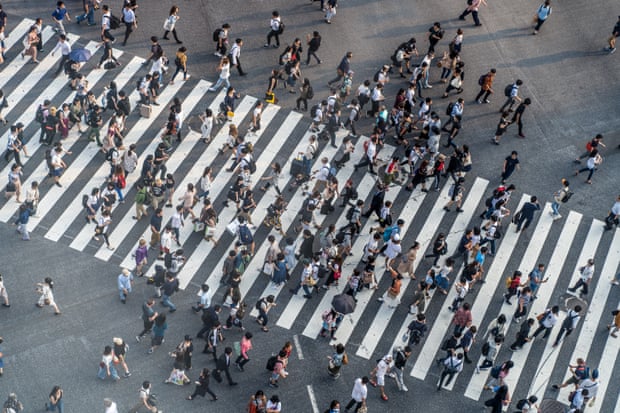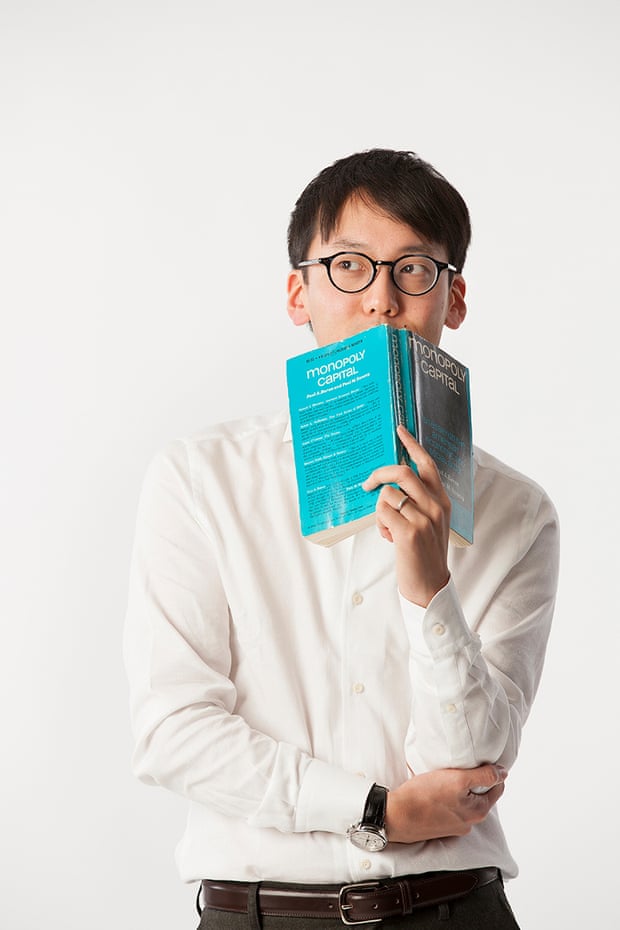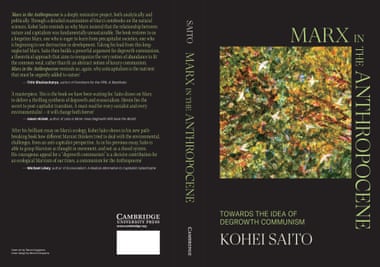Kohei Saito’s book Capital in the Anthropocene has become an unlikely hit among young people and is about to be translated into English

Photograph: Ruben Earth/Getty Images
Justin McCurry in Tokyo


Justin McCurry in Tokyo
Fri 9 Sep 2022
The climate crisis will spiral out of control unless the world applies “emergency brakes” to capitalism and devises a “new way of living”, according to a Japanese academic whose book on Marxism and the environment has become a surprise bestseller.
The message from Kohei Saito, an associate professor at Tokyo University, is simple: capitalism’s demand for unlimited profits is destroying the planet and only “degrowth” can repair the damage by slowing down social production and sharing wealth.
In practical terms, that means an end to mass production and the mass consumption of wasteful goods such as fast fashion. In Capital in the Anthropocene, Saito also advocates decarbonisation through shorter working hours and prioritising essential “labour-intensive” work such as caregiving.
‘I was as surprised as everyone else’
Few would have expected Saito’s Japanese-language solution to the climate crisis to have much appeal outside leftwing academia and politics. Instead, the book – which was inspired by Karl Marx’s writings on the environment – has become an unlikely hit, selling more than half a million copies since it was published in September 2020.
As the world confronts more evidence of the effects of climate change – from floods in Pakistan to heatwaves in Britain – rampant inflation and the energy crisis, Saito’s vision of a more sustainable, post-capitalist world will appear in an academic text to be published next year by Cambridge University Press, with an English translation of his bestseller to follow.
The climate crisis will spiral out of control unless the world applies “emergency brakes” to capitalism and devises a “new way of living”, according to a Japanese academic whose book on Marxism and the environment has become a surprise bestseller.
The message from Kohei Saito, an associate professor at Tokyo University, is simple: capitalism’s demand for unlimited profits is destroying the planet and only “degrowth” can repair the damage by slowing down social production and sharing wealth.
In practical terms, that means an end to mass production and the mass consumption of wasteful goods such as fast fashion. In Capital in the Anthropocene, Saito also advocates decarbonisation through shorter working hours and prioritising essential “labour-intensive” work such as caregiving.
‘I was as surprised as everyone else’
Few would have expected Saito’s Japanese-language solution to the climate crisis to have much appeal outside leftwing academia and politics. Instead, the book – which was inspired by Karl Marx’s writings on the environment – has become an unlikely hit, selling more than half a million copies since it was published in September 2020.
As the world confronts more evidence of the effects of climate change – from floods in Pakistan to heatwaves in Britain – rampant inflation and the energy crisis, Saito’s vision of a more sustainable, post-capitalist world will appear in an academic text to be published next year by Cambridge University Press, with an English translation of his bestseller to follow.

Kohei Saito is a Japanese philosopher and researcher.
Photograph: Courtesy of Kohei Saito
“It is broadly about what’s going on in the world … about the climate crisis and what we should do about it,” Saito said in an interview with the Guardian. “I advocate for degrowth and going beyond capitalism.”
The mere mention of the world degrowth conjures negative images of wealthy societies plunged into a dark age of shrinking economies and declining living standards. Saito admits that he thought a book that draws on strands of Marxism as a solution to modern-day ills would be a tough sell in Japan, where the same conservative party has dominated politics for the best part of 70 years.
“People accuse me of wanting to go back to the [feudal] Edo period [1603-1868] … and I think the same sort of image persists in the UK and the US,” he said. “Against that background, for the book to sell over 500,000 copies is astonishing. I was as surprised as everyone else.”
The 35-year-old needn’t have worried about using the language of radical change; as the world emerges from the pandemic and confronts the existential threat posed by global heating, disillusionment with the economic status quo has given him a receptive audience.
The pandemic has magnified inequalities in advanced economies, and between the global north and south – and the book struck a nerve with younger Japanese.
“It is broadly about what’s going on in the world … about the climate crisis and what we should do about it,” Saito said in an interview with the Guardian. “I advocate for degrowth and going beyond capitalism.”
The mere mention of the world degrowth conjures negative images of wealthy societies plunged into a dark age of shrinking economies and declining living standards. Saito admits that he thought a book that draws on strands of Marxism as a solution to modern-day ills would be a tough sell in Japan, where the same conservative party has dominated politics for the best part of 70 years.
“People accuse me of wanting to go back to the [feudal] Edo period [1603-1868] … and I think the same sort of image persists in the UK and the US,” he said. “Against that background, for the book to sell over 500,000 copies is astonishing. I was as surprised as everyone else.”
The 35-year-old needn’t have worried about using the language of radical change; as the world emerges from the pandemic and confronts the existential threat posed by global heating, disillusionment with the economic status quo has given him a receptive audience.
The pandemic has magnified inequalities in advanced economies, and between the global north and south – and the book struck a nerve with younger Japanese.

Saito’s academic text, Marx in the Anthropocene, will be published later this year, with an English translation of his bestseller to follow.
Photograph: Courtesy of Kohei Saito
“Saito is telling a story that is easy to understand,” says Jun Shiota, a 31-year-old researcher who bought Capital in the Anthropocene soon after it was published. “He doesn’t say there are good and bad things about capitalism, or that it is possible to reform it … he just says we have to get rid of the entire system.
“Young people were badly affected by the pandemic and face other big issues such as environmental destruction and the cost of living crises, so that simple message resonates with them.”
Saito agrees that growing inequality has given his writing more immediacy. “Many people lost their jobs and homes and are relying on things like food banks, even in Japan. I find that shocking. And you have essential workers who are forced to work long hours in low-paid jobs. The marginalisation of essential workers is becoming a serious issue.”
The response to Covid-19 had shown that rapid change is not only desirable, but possible, he says.
“One thing that we have learned during the pandemic is that we can dramatically change our way of life overnight – look at the way we started working from home, bought fewer things, flew and ate out less. We proved that working less was friendlier to the environment and gave people a better life. But now capitalism is trying to bring us back to a ‘normal’ way of life.”
‘Marx was interested in sustainability’
Saito is deeply sceptical of some widely accepted strategies for tackling the climate emergency. “In my book, I start a sentence by describing sustainable development goals [SDGs] as the new opium of the masses,” he said in reference to Marx’s view of religion.
“Buying eco bags and bottles without changing anything about the economic system … SDGs mask the systemic problem and reduce everything to the responsibility of the individual, while obscuring the responsibility of corporations and politicians.”
Advertisement

“I discovered how Marx was interested in sustainability and how non-capitalist and pre-capitalist societies are sustainable, because they are realising the stationary economy, they are not growth-driven,” Saito said.
Since the book was released, Saito has made Japan noticeably less squeamish about the German philosopher’s ideas.
The conservative public broadcaster NHK gave him four 25-minute segments to explain his ideas for its Masterpiece in 100 Minutes series, while bookshop chains cleared space for special displays of revivalist Marxist literature.
Now he hopes his message will appeal to an English-language readership.
“We face a very difficult situation: the pandemic, poverty, climate change, the war in Ukraine, inflation … it is impossible to imagine a future in which we can grow the economy and at the same time live in a sustainable manner without fundamentally changing anything about our way of life.
“If economic policies have been failing for 30 years, then why don’t we invent a new way of life? The desire for that is suddenly there.”
Photograph: Courtesy of Kohei Saito
“Saito is telling a story that is easy to understand,” says Jun Shiota, a 31-year-old researcher who bought Capital in the Anthropocene soon after it was published. “He doesn’t say there are good and bad things about capitalism, or that it is possible to reform it … he just says we have to get rid of the entire system.
“Young people were badly affected by the pandemic and face other big issues such as environmental destruction and the cost of living crises, so that simple message resonates with them.”
Saito agrees that growing inequality has given his writing more immediacy. “Many people lost their jobs and homes and are relying on things like food banks, even in Japan. I find that shocking. And you have essential workers who are forced to work long hours in low-paid jobs. The marginalisation of essential workers is becoming a serious issue.”
The response to Covid-19 had shown that rapid change is not only desirable, but possible, he says.
“One thing that we have learned during the pandemic is that we can dramatically change our way of life overnight – look at the way we started working from home, bought fewer things, flew and ate out less. We proved that working less was friendlier to the environment and gave people a better life. But now capitalism is trying to bring us back to a ‘normal’ way of life.”
‘Marx was interested in sustainability’
Saito is deeply sceptical of some widely accepted strategies for tackling the climate emergency. “In my book, I start a sentence by describing sustainable development goals [SDGs] as the new opium of the masses,” he said in reference to Marx’s view of religion.
“Buying eco bags and bottles without changing anything about the economic system … SDGs mask the systemic problem and reduce everything to the responsibility of the individual, while obscuring the responsibility of corporations and politicians.”
Advertisement

“I discovered how Marx was interested in sustainability and how non-capitalist and pre-capitalist societies are sustainable, because they are realising the stationary economy, they are not growth-driven,” Saito said.
Since the book was released, Saito has made Japan noticeably less squeamish about the German philosopher’s ideas.
The conservative public broadcaster NHK gave him four 25-minute segments to explain his ideas for its Masterpiece in 100 Minutes series, while bookshop chains cleared space for special displays of revivalist Marxist literature.
Now he hopes his message will appeal to an English-language readership.
“We face a very difficult situation: the pandemic, poverty, climate change, the war in Ukraine, inflation … it is impossible to imagine a future in which we can grow the economy and at the same time live in a sustainable manner without fundamentally changing anything about our way of life.
“If economic policies have been failing for 30 years, then why don’t we invent a new way of life? The desire for that is suddenly there.”
Ours is an era of capitalogenic climate crisis: the geological Anthropocene is made by capital, not “human influences.” Since 1854, ninety corporations emitted two-thirds of industrial CO2 emissions. Today, the richest one percent emit twice as many greenhouse gases as the poorest fifty percent.
capitalocene.org/2022/05/25/unthinking-the-anthropocene-man-and-nature-in-the-c…
No comments:
Post a Comment